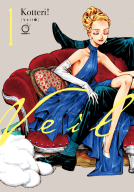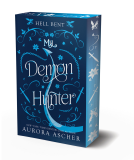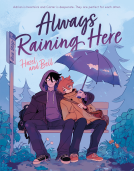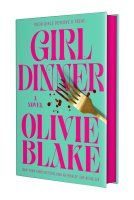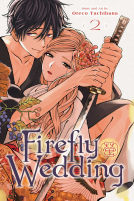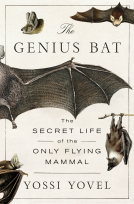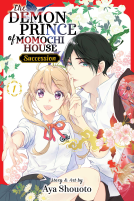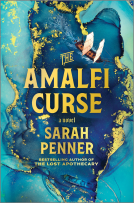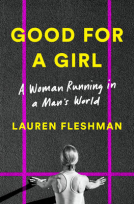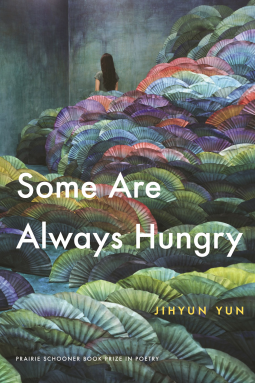
Some Are Always Hungry
by Jihyun Yun
This title was previously available on NetGalley and is now archived.
Send NetGalley books directly to your Kindle or Kindle app
1
To read on a Kindle or Kindle app, please add kindle@netgalley.com as an approved email address to receive files in your Amazon account. Click here for step-by-step instructions.
2
Also find your Kindle email address within your Amazon account, and enter it here.
Pub Date Sep 01 2020 | Archive Date Sep 30 2020
Talking about this book? Use #SomeAreAlwaysHungry #NetGalley. More hashtag tips!
Description
Advance Praise
“Image by clear-eyed image, sound by tightly wrought sound, the poems in Some Are Always Hungry are a thundering revelation. At once a reckoning with immigration and historical trauma and rooted in the sensorial world, these poems are timeless and ongoing. Here is both the fever and the scar it leaves, the female body and the lineage of power, hunger, and desire, what cannot be forgotten and what keeps us alive despite it all; here is a poet staking her undeniable claim on the world.”—Ada Limón, author of The Carrying
“In this visceral yet compassionate inquiry into what makes us alive, Yun shows us how hope can be fashioned out of the desire to speak on and through atrocities. This book is one of those rare collections that stuns me back to my own life, somehow renewed, somehow better, kinder, and less alone.”—Ocean Vuong, author of Night Sky with Exit Wounds
“Jihyun Yun’s captivating poems hold a wise and magnetic energy at the center of each page, one rarely seen in a first book. This is a poet of grace and elemental blood-wisdom who will pull you to unexpected terrains where food is a vehicle not just to explore lineage and ancestors but to navigate the winding roads of the present and the future. . . . Some Are Always Hungry is a most magnificent and memorable debut from a deeply talented poet I’m certain we’ll be turning to again and again.”—Aimee Nezhukumatathil, author of Oceanic
Available Editions
| EDITION | Other Format |
| ISBN | 9781496222183 |
| PRICE | $17.95 (USD) |
| PAGES | 90 |
Featured Reviews
Some Are Always Hungry by Jihyun Yun is a lovely work that weaves together from a single thread a whole that is both relevant and timeless. The immigrant experience is detailed through the story of food, or lack thereof, as a means to bond and unite and, ultimately, to sustain. These are powerful words of survival, sharply observed, and strung together in a beautiful and deeply affecting way.
Many thanks to NetGalley and University of Nebraska Press for the opportunity to read this ARC.
This poetry collection was absolutely stunning. Every poem was brutal and painful and gorgeous. I love anything that considers the layers of mother-daughter relationships and this one dug so deep, especially when considering race and history in relation to Korean identity. It’s a quick read but it packs a firm punch.
I don’t read a huge amount of poetry but this was really stunning. The writing style really blew me away, a lyrical feel that wove its way throughout every poem, linking them together. I enjoyed the themes of identity, womanhood, and of course food.
It was a quick read, but it held great depth and a rawness that makes me want to reread them again. I know that with each reading I will find new meaning and understanding of these poems and I look forward to revisiting them again in the future.
I hadn’t read any of Jihyun Yun’s work before this collection and I can’t believe I’ve been missing out on this brilliance. “Some Are Always Hungry” is a visceral, empowered, genius examination of womanhood, the body, and how bodies + lives are viewed and valued by society. I don’t think I can pick a favorite, but I will say that the first poem, “All Female,” was astounding as an introduction to Yun’s work. There, Yun examines the reality that we always destroy the female body, whether it’s a chicken or a crab or the way female humans are oppressed and fetishized. I had never thought of our traditions that way, but it’s true. And this poem and its insights and profundity are the tip of the iceberg in this collection.
I will loudly proclaim my admiration and awe of “Some Are Always Hungry” and the remarkable, revolutionary work of Jihyun Yun. Thank you so much to the publisher and NetGalley for this advance copy. This review is entirely unbiased and effusively positive.
I have mixed feeling about this collection of poetry. To begin I was pulled in by the lyrical style and connecting themes and I enjoyed the viewpoint.
Yet, the second half of this collection, or perhaps closer to the final third, didn't hold my attention as much.
Overall it was a good read, and I would probably pick up more work by this author in future.
It is all very glamorous the way only memorials / for tragedy can be
Here the tragedy is raw and harrowing. Hunger haunts Jihyun Yun's poems, where recipes and stories intermix. She blurs the boundaries between food and female bodies, presenting both as frequently dismembered and displaced. It's a very visceral collection of poems, unabashedly tethered to the body. Particular favourites included "Menstruation Triptych," "Benediction as Disdained Cuisine," and "The Leaving Scene."
Readers who enjoyed this book may be interested in Ocean Vuong's On Earth We're Briefly Gorgeous, Kim Thúy's Ru, and Aracelis Girmay's The Black Maria.
I felt like each piece I read herein linked to the next and so forth until I came to the end of the book.
The author explores survival, war and in a most refreshing way links it to the sea and to food, and that in itself got me because food carries memories and it seemed as though every word written here brought me back to those places, those feelings at that time.
Thanks Netgalley for the eARC.
I feel slightly raw after finishing this poetry collection, and I mean that in the best way. It's so graphic, honest, and vulnerable. Each poem packs a real punch, and it was it was discomfiting in a way that I think was very intentional and well executed. This collection thematically deals with hunger (clearly), poverty, survival, sex; this is to name only a few. Leaving off one star because I did feel that some of the poems seemed almost disjointed and slightly impacted the reading experience for me.
Love the concept of this collection of poems. Showing the immigrant experience via food. These poems are raw and emotionally honest. I'm grateful I got to read this fascinating book.
I struggled a lot with this one. I am always eager for stories from immigrants, it's such a unique perspective and truly singular experience - no two are the same. I crave to read about more stories like that of my father and mother, to see how they translate to other cultures and other mother tongues.
I failed to connect with this one, I didn't feel like there was a clear reasoning for the order of the poems, there was no natural progression of the 'story' for me.
“If our feast ever happens, if time has not misplaced us, may these girls rise violet from the pot, untangle their legs from perilla and leek and make for the sea with their limbs in their teeth.” Did you ever think about how people ‘abuse’ food like most wouldn’t dare with other people?
Food and humanity, Korean history and survival. Hunger is a raw feeling, it can make the starving treat other people no different from food. They take what they need, ignore what they can’t use, forgetting who they are in the process. War and hardship can bring out the survival mode in anyone. Don’t think you can resist the temptation if it happens to you, few can.
There is always hope though: “Even newly out of war, we are afflicted with spring. A flower grows through the hinge of a bone, all stem and snapdragon.”
Many of the poems are set in Korea. Some Are Always Hungry gives insight into Korean history and food. It also brings up issues that are relevant in other parts of the world: “The skin curls beneath the paring knife’s persuasion, as I think of colonization via inheritance of memory. These words I’ve no reason to know but do.” There could also be a positive reason for that though: travel, as I know the Korean word for carrot as well…
The poems in Some Are Always Hungry have a good flow and read like stories. I’m impressed by how well the layers blend without it feeling forced. Within this poetry collection, you’ll find many beautiful poems that both read like a description of historical events – scenes from someone’s life – and recipes. They show human nature, though mostly the worst of it. Even in these short poems, Jihyun Yun can make the unnamed characters come to life. You feel for them, but you also sympathize with the food. As if the leek I chopped for dinner suddenly grew eyes and brains. Recommended. This collection of poems is a gem (and has such a beautiful cover!).
Absolutely beautiful words, powerful and raw. This poetry that speaks to emotion and experience. Lovely and literary — I recommend Some Are Always Hungry.
Name: Some Are Always Hungry
Writer: Jihyun Yun
Genre: Poetry, War, Violence
Review:
Of wisdom, splendid columns of light
waking sweet foreheads,
I know nothing
but what I’ve glimpsed in my most hopeful of daydreams
of a world without end,
amen
—Li-Young Lee
A collection of heartbreaking poetries that speak about war, immigration and their struggle for survival. The poetess has this silent rage and numbness mixed with her poetries which which explores her life as a girl in immigration to a foreign land. Each poetry talks about different aspects of her life as well as her family's. She explores the struggle of being a immigrant and expresses her connection to her motherland. Through cooking recipes to mythmaking, she dwells into her personal as well as natural history, which gives us a deeper insight to her past.
 Daisy W, Reviewer
Daisy W, Reviewer
Advanced review copy provided by the publisher via Netgalley in return for an honest review.
Wow. I do not often read poetry, but the synopsis of this collection was intriguing and I was completely blown away by the mastery of Jihyun Yun.
Some are always hungry is a collection of poetry that presents themes of womanhood, immigration, family life and the struggle for survival through the lens of food and dinner time. This is unlike anything I have ever read before, and I was blown away by the heartbreaking exploration of trauma and family in the midst of war. I am not well versed in the world of poetry, but I loved this collection and would highly recommend it to anyone interested in the themes it explores!
 Abby S, Reviewer
Abby S, Reviewer
Beautiful raw revealing, The poet has a magical way with words.Highly recommend this immersive book of poetry .# netgalley #uofnebraska
What a beautiful, painful, disturbing and stunning collection of poetry. The writing is dense, setting it apart from the plethora of accessible poetry that exists nowadays. There is a time and a place for the Rupi Kaur-style of poetry, but Yun’s writing is literature that you can really sink your teeth into. It is not there to be empathised with, nor does it exist to calm our souls or make me feel heard. It exists to make itself heard, to inform me, not to settle me. It is often completely painful reading, but so utterly important. The writing explores themes of poverty, woman-hood, family, abuse, lack of education, racism, diaspora and the effects of these on the human body, soul and mind.
The language is mouthy and tangible, lyrical - like you can chew on each word. It is beautiful and whole. This feels appropriate given it centres around recipes, food and the home kitchen. This brings the writing into the home, and everything else spills out from this central idea. It’s completely original, again setting it apart from so much other poetry. The feeling of homeliness also provides a stark contrast to the dark and heavy nature of so many of the poems. This works really well, and draws attention to pain at all the right moments and all the right ways. These are important words.
My criticisms are few - sometimes the writing became so dense that it felt impenetrable, like I’d missed the point and meaning, or perhaps that there wasn’t really a point to it in the first place. At times this felt frustrating. At other times, the voice could become confusing and disjointed, like another voice had entered the scene, unexplained. But then in some ways this was refreshing and grabbed my attention in new ways.
I loved this book - I think it’s beautiful and important.
A heart wrenching collection of poems. This book was filled with beautiful and sad poems, and I found them to all be powerful and great. I really liked reading this book!
This book follows the life of a family from the perspective of a daughter through war, starvation, and immigration. I am assuming that this story follows a Korean family who had to do everything to survive during the way that leads to the division of Korea. A story told through recipes, tales of fictional characters, discomfort, and shame.
I felt how personal this book was. You cannot express such emotions unless you have gone through it. I enjoyed the way some things and situations were explained. Take for example when she talked about miscarriage her the shame she felt being an unmarried woman, she used the description of a stepmother poking a mouse. Or when she talked about bombings, "the planes dropped their eggs, hatched a red so loud the landscape was struck briefly mute"
"Call us lotus, we bloom in rot" a line from the poem 'For Now, Nothing Burns' has to be my favorite in the whole book.
It is quite a short book, I hope you check it out.
When the first blood releases between your thighs, they'll come. You were born knowing to mourn this."
Some Are Always Hungry is a timeless collection of poems. Jihyun Yun's exploration on immigration, food, family, womanhood, survival, war amongst many other things through evocative words is one of the best poetry collections I've read in a long time.
This collection is filling while making you beg for more. I love how unrestrained the poems were and felt to me. They hit the nail on the head, no hanky-panky or shenanigans.
I was honestly impressed by this collection. So impressed. I went in, not knowing what to expect, not having any high hopes and I was blown away. I was blown away so much that it helped me get my writing groove back and I penned down two poems the night I started it.
If you are looking for a collection of poems that will (mostly) make you tick all your boxes in what you are looking for in a poetry collection, read this!
This poetry collection is utterly jarring, raw and dense even in its brevity. Loss, shame, and rage are made material with disturbing imagery of food and the human body. I had to take breaks after every few poems because of how powerful and heavy they were - I wanted to sit with the weight for a while. Not a book I will soon forget.
 Hafsah H, Reviewer
Hafsah H, Reviewer
In this collection, the author explores a range of topics. From war to immigration to a lack of food and survival. I thought it was intriguing, I did enjoy a lot of the poems. This is a solid poetry book. For me, there was just something lacking. There were a few poems that I thought were boring and just couldn't connect with.
I have never read a book like this and want to reread it and dissect it. At first, I found it difficult to hook into but once I settled into the poetic form and content I found the narrative rich yet harrowing, real and devastating.
The inclusion of periods and what they signify to a girl growing up stand out as a vivid theme within the story. The betrayal of someone who should care for you, the lies that people are willing to act upon to get their own way.
I am left wanting more
 Reviewer 524700
Reviewer 524700
This was a really poignant collection that touches on generational trauma, war survival, and immigration through the lens of recipes and the existential meanings that food can carry. Really well written and like a filling meal, Some Are Always Hungry is worth ruminating on all the flavors and undertones of each word and phrase.
Thank you to #NetGalley for providing a copy of this poetry collection. Looking at the Korean experience through war, occupation, immigration and integration, this multigenerational vision uses food and hunger to bring everything together. The visceral imagery was compelling and I was left hoping that the author might consider, one day, writing a full memoir of their family experience over the last 100 years. Combining poetry and prose poetry, this collection is hard hitting, creative, beautiful, sad, sickening and also, on occasions, made me hungry.
Thank you very much for the ARC.
A very beautifully written poetry collection that packs so much in such a short read. A poignant look on immigration, poverty, hope, self-expression and food.
 K A, Librarian
K A, Librarian
This is an extremely beautiful and visceral exploration of womanhood, food, violence, and immigration and I really enjoyed it. I don't often read a lot of poetry, but Jihyun Yun's words are powerful and dense (in a good way) and it's one I'll definitely read more than once. A very talented poet.
Thank you to University of Nebraska Press and Netgalley for the ARC.
Some Are Always Hungry gives insight into Korean history and food. It also brings up issues that are relevant in other parts of the world: “The skin curls beneath the paring knife’s persuasion, as I think of colonization via inheritance of memory. These words I’ve no reason to know but do.”
Within this poetry collection, you’ll find many beautiful poems that both read like a description of historical events – scenes from someone’s life – and recipes. They show human nature, though mostly the worst of it. Even in these short poems, Jihyun Yun can make the unnamed characters come to life. You feel for them, but you also sympathize with the food. The speaker is the recipient of harm from those who have more societal power, yet she also inflicts harm on powerless creatures. She wrestles with the consumption of her body, as well as the ethics of her own consumption and hunger. This nuanced portrayal of morality gives rise to a second key question: How do people live in the messy aftermath of survival? The poems in this book answer this question with accounts of both submission and cruelty. Some Are Always Hungry resists offering a clean-cut path or reconciliation, but instead realistically hovers in the unsettling space between anguish and peace.
 Gazala A, Reviewer
Gazala A, Reviewer
The cover of this book is beautiful and the premise seems interesting. However, when I started reading it, my experience was different altogether. It's strange and eerie and made me uncomfortable. I don't know if I'd recommend it to anyone. It's full of details that are raw and gory that might make one feel sad and cringe at times. The parallels drawn between women and different things are truly worthy of appreciation.
 Christina R, Reviewer
Christina R, Reviewer
Today I am #reading: Some Are Always Hungry by Jihyun Yun (@jihyun.o.yun). This left me hungry for more. Filled with family, history, discovery and masterful storytelling. Beautiful use of language with hard-hitting truths and stunning imagery.
Jihyun Yun is a Korean American poet. Her poetry is not straightforward, yet it has an immediacy and rawness that demands your attention.
The imagery is stark at times, metaphors can be brutal. It pulls no punches and doesn't avoid difficult subjects. Women likened to meat. Violation. The onset of puberty. War and its aftermath. Hunger not just about food. Desperation. Family relationships. Separation and new beginnings.
There is a lot of analogy with food preparation and some poems even give recipes. Some things had to be looked up as I am not familiar with Korean cuisine.
A selection of imagery from the poems:
'a fevered petal hung on the hurt of daybreak'
‘bellies swelled like winter melons split too soon from a vine’
‘Our tongues boiled down to language, broth skimmed of birth fat.’
‘Back then, we weren’t made for tenderness, though swathed in summer we fooled ourselves.’
‘Azalea and baby’s breath drop petals on the nightstand like fly’s eggs.’
‘the slow arc of a dust-bloodied moon illuminating garbage’
Some poems struck me more immediately than others, but all are worth reading. There are many layers and much to consider. As with all poetry, you impose your own interpretation, which may or may not concur with the poet's.
I will be interested to see what direction Jihyun Yun's poetry takes next.
I was sent an advance review copy of this book by the University of Nebraska Press, in return for an honest appraisal.
Review: Some Are Always Hungry by Jihyun Yun.
Winner of the Prairie Schooner Book Prize in Poetry, Some Are Always Hungry chronicles a family’s wartime survival, immigration, and heirloom trauma through the lens of food, or the lack thereof.
This collection is certainly unforgettable, in how it uses language and metaphor to deliver imagery that is second to none. 'The Leaving Season' is a great example of how the author uses food and imagery as a way of portraying human emotion as she uses the example of a pig, and though somewhat uncomfortable I was, the use of the imagery was incredible and made you able to understand what the writer was trying to deliver, it leaves you with food for thought.
There there are the moments in this collection that are powerful and leave an impact. Lines in these poems that just leave you left with the story that is being told. In particular, 'Grandmother, Praying' in particular comes to mind, with 'The Leaving season'. It is lines such as “Sun, in this life, I will be your daughter And you will teach me how to run” that just pack a punch and leave you provoked for a long time after you have read it.
An excellent collection of poetry that is clever and thought-provoking, I'm glad I got the opportunity to read it.
(I received an ARC from Netgalley for honest review).
This book was a delight to read. It was lush, gorgeous, and bound by love. I wanted to read more poems Yun. I want to read everything she's ever written and everything she's going to write. This collection, aside from its beauty and it capsule-like quality, is also a lesson in witnessing and in capturing.
<b>A raw and stunning poetry collection, which has won the Prairie Schooner Book Prize in Poetry. Powerful poems which I'll be thinking about for a long time.</b>
This collection by Jihyun Yun is inter-generational, with most poems focussed on grandmother, mother or daughter, and weaved in with Korean folklore. Some of the poems are set during the Korean War, others are on life in America as an immigrant. Hunger in some poems relates to food (or lack of), while others speak of love or longing for Korean traditions. In many of the poems, the line between food and the female body is blurred to reflect misogyny, consuming of females, or dangers of womanhood. The first poem, <i>All Female</i> is a perfect start to what is at times a harrowing collection, and sets the major themes of food, culture, and womanhood perfectly--why it is usually the female of a species who is cooked and eaten? The language of this poem is visceral, and matches the rhythms of women pulling apart female sea creatures while preparing food. It is clear from this poem just how good this collection will be, and the rest of the book does not disappoint.
<i>Some Are Always Hungry</i> doesn’t tell a linear story as such, but there is a cohesiveness which ties the poems together. Spanning about seventy years--from life before and within a war-torn Korea, through to life as a Korean-American--different forms of hunger, suffering, and cultural identity are explored, often through the lens of food. It is more of a sweeping story which touches on moments from each generation, until the final poem rounds the collection off in a way which is both haunting and satisfying. I read the book in one sitting, but it could equally be enjoyed in smaller chunks. Each poem is powerful enough to stands on its own.
My favourite poems are All Female; For Now, Nothing Burns; Field Notes from My Grandparents; Homonyms; The Daughter Transmorphic; Saga of the Nymph and the Woodcutter; The Tale of Janghwa and Hongryeon; Menstruation Triptych; Savaging; Revisitations; The Leaving Season; and Reversal.
The poems are often heavy in theme, and brutal in their depictions. They cut right to the meat of issues, and there are some difficult subjects: violence, abuse, death, starvation, powerlessness. I cried several times reading this. These subjects are handled well--powerful, blunt yet lyrical. Suffering is balanced by family love, belonging, and heritage, and these shifts are all the more beautiful in context of the darkness.
Aside from the raw lyricism of the collection as a whole, of note are the couple of poems which are in the form of a recipe. These poems in particular speak of respect for elders and heritage, as well as a feeling of loss and displacement in a country not particularly open to other cultures.
Overall, this poetry collection is a great choice for a viewpoint on war and immigration, womanhood, and the importance of food (both culturally and in order to survive). Five stars, but be warned that it is a harrowing read at times, with poems which don't shy away from violence or suffering.
<i>"At the end of this story,
I walk into the sea
and it chooses
not to drown me."</i>
Thank you to University of Nebraska Press and NetGalley for providing an Advance Review Copy, which I have reviewed voluntarily and based on my own opinion.
 Geoff U, Educator
Geoff U, Educator
Powerful poems about war, refugees, immigration, and above all family. All around amazing structure, language, and emotional intensity. Will be returning to these poems again. Some of the forms were also creative, like 'War Soup':
Ingredients
*Pork Belly
*Anchovy Broth
*Instant noodles
*Onion
*Garlic
*Spam
*Hot pepper paste
*American Cheese
*Kimchi
1. In eight cups of boiling water, add dried kelp and anchovy, soaked shitake mushrooms and onion tops to make a broth. Grind four cloves of garlic together with hot pepper paste, soy and sugar for seasoning. Set the mixture aside for later.
2. Onion carpeted in pork fat and rice wine flared, very briefly, an ignited landscape. Then sun-dried pepper flakes staining the oil, a sundry of roots tossed in at rough dice, zucchini cut to half-moons, halved and quartered heads of kimchi. The stock should not disappoint, heavy with anchovy and odd bits. Set it all to boil, no witness, low heat.
3. We’ve not long been able to afford this: life giving flesh, singed wire hair that remembers outhouse and apple core. The fat ripples its own horizon, studded white over pink meat, cartilage wedged there where the muscle gathers. Cut the slabs into mince, light those dented pots.
4. Dear family I left behind
in the northern province of my birth,
do you live as I feed and am fed
have they given you to sea?
5. Then Spam, more tofu than animal, cut to cubes. Say, we made do with what we did. At the bases, the Americans gave cans of beans or meat. We weren’t picky, boiled it all with weeds and scraped carcass. We called it Johnson-tang, rejoiced like we’d never again need to eat, as if the miles were no real thing. Now chili, now green onion sprigs.
6. The northern village of my birth, a storm crushed window. The gaunt faces of my people parade the TV screen; dear lord, dear leader.
7. Let the noodles wilt
over broth just before serving.
At the table, over kerosene flame,
three generations tend to the pyre
that feeds and feeds.
What a blessing,
to have passed through hunger.
I will teach my daughters
to bare their palms.
I will teach them how to beg.
Although I very much appreciate the opportunity to have read Some Are Always Hungry, I unfortunately did not particularly enjoy the experience. I would have to say that it just “wasn’t my thing”.
Being someone who loves food (Korean food in particular), I found the idea of using food as an anchor in poems with themes ranging from immigration to womanhood to survival to be more than intriguing. However, I failed to connect with the majority of the poems featured here. There were very few that seized my attention or made me stop and think. I did not find myself re-reading anything to soak in the beauty of a line; the poems failed to evoke any emotion in me.
While the book of poetry is a short, quick read, it is unfortunately not one that I would find myself recommending. Again, it may be a 10/10 for someone else, but it was just not my cup of tea.
 Elizabeth D, Reviewer
Elizabeth D, Reviewer
A heart-wrenching collection of poetry that covers living through war, immigrating to a new country, and trauma (both past and present). A lot of emotions were explained through passages describing food, which I found to be incredibly effective. Everyone eats food and has their own unique traditions surrounding cooking and dining, so it's a universal experience. Even if your personal experiences with food are not exactly the same, it's an easy language to empathize with. Many of the themes also centered around being female during war/after immigrating, which added an extra layer to the collection. Overall, I found it very powerful and effective in portraying an important story.
Thank you to the publisher, University of Nebraska Press, for sending me a digital ARC of this book via NetGalley.
First of all, thanks to NetGalley for providing a copy.
Although it was hard to get into, I ended up really liking this collection of poems. Some Are Always Hungry talks about past and present traums in general. More specifically, it delves into:
- the experience of life through war. How did people survive through foreign invasion? did they keep their Korean identity? or did something change? Not to forget also, the aftermath of war (present in most Korean novels and works of poetry to be honest):
"My dear, the war is over.
A distant country tells me we are split."
- the experience of immigrating to a new country. Focus on the immigrant experience of trying to adapt to a new country while keeping your identity and not forgetting about the past. An interesting thing the author does is that she uses recipes as a way of introducing issues that are hard to talk about. Very original and effective I think!
- the experience of being a woman. She addresses menstruation and the stigma that comes with it, unwanted pregnancy, the place of women in society, not standing up to men because afraid to hurt their ego. There are also traces of ecofeminism where she compares her womanly fate to that of pigs who are going to be used for meat. Very interesting to see this parallel that is often ignored, it is something that speaks to me. An excerpt from a poem I really liked:
"At home,Im so happy
to be bledding, I pummel my stomach against
the kitchen counter,
just in case. I know
it doesn't work
that way, but he came without permission and inside.
I'm irrational is what I mean.
Bloodless, others fly
to nearby countries to terminate but I'm too
woman, too poor.
Lord, in this life I'll happily bleed and bleed. Let the animals gnaw through every door. Let the tides overpower."
Overall a good experience. Will pay attention to this author in the future.
 Reviewer 431600
Reviewer 431600
This poetry collection was awe inspiring and just stunning. Yun's writing flows beautifully and each poem is so raw and invoking of emotion. I loved seeing how it's written like family memories sewn together. Beautifully done, and highly recommended.
I don't often go for poetry, because I have to be in a certain mood, but this now only drew me in with the beautiful cover, the idea of using food to describe characters, emotions, events and simply life was terribly tempting.
I could identify with this compilation as I also changed cultures and countries, so it was relatable on a whole different level.
It's dark, raw, real and emotional. It hits different.
I would highly recommend to anyone who wants to read more about family, cultures, immigration, survival, struggles.
Lately I’ve started giving poetry genre a long overdue chance they deserve and explored a few very popular and well-hyped poetry books which failed to shine on me its brilliancy.
And now I have a strange, unpredictable winner of best one I’ve read so far. It’s Some are Always Hungry!
Purely due to my want of reading something unexplored yet and its promise of weaving several intricate themes with Korean cuisine (“through the lens of food”, it says), I decided to give it a try.
It blew me away!
Sheer creativity, blunt and raw approach perfectly blended with the use of allegory and metaphors that drove the sharp blade softly to draw a reader’s emotions out, gut-wrenchingly vexed depiction, and unapologetic, defiant representation of Korean culture through “recipes” and cuisine.
Written by an immigrant Korean author Jihyun Yun who lays out various inter-related themes of war, immigration, survival, poverty and hunger, familial ties and culture that threatens to be shredded, womanhood and femineity.
Her prose flow is so brilliant, it was impossible not to get sucked into the delirious world she masterfully sketched out, though I must add, the gory contents may turn off a few sensitive readers.
At first, I started taking notes of my favorite pieces from the book but soon I realized I liked almost all of them very much so I had to stop.
I’ve been interested in all Asian cultures passionately and have been learning Korean for a while. I believe it definitely had a positive reading experience for me that I could understand the few untranslated Korean words easily.
The only thing I disliked and is purely due to my own preference was:
Few proses with the writing style of “……./……/……./” They seems to be “in trend” these days that I just cannot seem to get into. I feel like they tend to lose the gravity and weight of the emotions trying to be conveyed all while getting erratic and fragmentary.
Overall, I would definitely recommend this to:
Every poetry lover, anyone who doesn’t shy away from themes explored in a grim, grisly way, anyone who wants a little taste of Korean food styles and “recipes” (they ain’t your usual, I tell you!), anyone who prefers disturbing yet real depiction of all the themes quoted over flowery ones.
Thanks to NetGalley and University of Nebraska Press for this eARC in exchange for an honest review!
This collection of poetry is predominantly focussed on the physical and emotional hardships of the immigrant experience, and the ways this trauma can be passed from one generation to the next. The use of language is visceral, the structure playful, and several lines throughout hit me like a sucker punch.
There is such reverence for food in this collection, and I thought this recurring motif was used really effectively. Yun explores the art and ritual of food preparation, celebrating its ability to connect families with their heritage; tastes and smells transporting them to their homeland. But she also comments on the intense, animalistic consumption that is often inherent to those who have known true hunger.
Though deeply personal, the collection pulls back at times to take in wider contextual details, exploring the various factors that can push people to relocate in the first place. War, Occupation, abuse, and poverty are all touched upon, as are the various issues that await immigrants when they reach their new homes, such as racism, language barriers, and a pressure to shed aspects of their identities – even down to their birthnames.
While it’s fair to say there isn’t a huge amount of light to balance the themes’ innate melancholy, it’s an impressive collection overall, and Yun is a poet I’m glad to have discovered.
I am in the process of expanding my poetry horizons, so take all my poetry thoughts with a grain of salt. That being said Some are Always Hungry was a beautiful collection, full of sorrow and truth. Some of the poems took my breath away.
 Nocturnal R, Reviewer
Nocturnal R, Reviewer
#SomeAreAlwaysHungry is a collection of poems and an intense book that explores trauma, hunger, pain, desire, and the female body. The author has brilliantly penned and didn’t shy away to express the tiny details and they are a few intense episodes where the reader witness the horrific pain one has gone through for food out of hunger which are heartbreaking.
Author’s writing is lyrical and intense that you are under her spell witnessing through the eyes of Jihyun.
I should definitely talk about the cover; I can’t praise the book cover enough as how gorgeous and Pretty it is.
I would highly recommend this book who love literature.
Thank you #NetGalley for giving this opportunity to read this gem of a book.
 Reviewer 580071
Reviewer 580071
well versed book which sparks intimate feelings. I'd recommend it if you need a book that makes you think about stuff that you won't think about in daily life. Just read it.
Some Are Always Hungry by Jihyun Yun
A collection of poems, some of which were so profound (read emotional, violent, relatable and tender) I took breaks in between reading them. Others, I'll need a little more time to appreciate their true meaning... normal for all poetry I guess.
The poems revolve around what it is like being a woman, an immigrant/refugee. The violence and loneliness that comes with it. The idea of a hunger is the best description for this.
The hunger is as physical as it is emotional. Be it trying to survive in a war stricken country with no food to eat or surviving the sexual violence and gaslighting that comes with it. Jihyun has a way with words that just makes you want to cry and wallow in the hopelessness that the persona experiences. The women are of different generations helping assert the idea that abuse is not a monolith. It happens in different forms and the victims develop different coping mechanisms, be it selective amnesia (the mother), violence towards whatever is around (in her case food/animals) or suicide as with the teenager. The reactions are so different. The comparison of the female body to a pig in relation to reproductive rights and autonomy over their own body is the one part that stuck to me. The metaphor was just so obvious and yet not so. I read that and just needed to take a minute. The emotions in the poems are so raw... You can taste the desperation... I held my stomach with the mention of banging it by the kitchen sink. The loneliness of leaving home to a place you thought better that ends up not living up to your expectations then going back home to see that life went on without you. Trying to figure out where home really is.
There is the hunger by by men to consume, control and change female bodies to their own selfish needs. The husband stitch was especially repulsive.
The structure of these poems was also very effective and beautiful, plus the inclusion of the recipe form...chef's kiss. How different the form and structure of one poem was to the next helped in putting in breaks in the flow and foregrounding certain areas.
Definitely going to revisit this book in the near future
I always enjoy poetry when it is a detailed account of a families trials, truths, and triumphs. This was such a great poetry book. I really enjoyed it.
5 stars. I loved this poetry collection. It was haunting and the rhythm of each poem was transcendent and beautiful. Review to come.
Due to being a high school teacher, I often fall behind on writing reviews. Here are my initial thoughts.
 Ari P, Reviewer
Ari P, Reviewer
An immensely powerful collection: profound and violent both at once. There really is very little to say about this book other than that because Jihyun Yun has left me speechless.
Some very beautiful and touching writing, loved the theme of food. There were a couple of poems that felt weaker and a bit out of place, but overall a great debut collection and definitely an author I'll keep an eye on for future works!
Some of my favourites include "War Soup", "Recipe: 닭도리탕", "My Grandmother Thinks of Love while Steeping Tea" and "Reversal".
 Tina B, Reviewer
Tina B, Reviewer
Stunning poems about food and family, immigration and inheritance, diaspora and the dinner table.
An intimate, raw, and heartbreaking collection of poems.
This not only drew me in with the beautiful cover, but the idea of using food to describe characters, emotions, events and life was just absolutely brilliantly done!
I want to thank NetGalley, the author Jihyun Yun and University of Nebraska Press for providing me with an eARC of this publication. In return, I have promised to provide an unbiased review.
Readers who liked this book also liked:
Mamenosuke Fujimaru
Comics, Graphic Novels, Manga, Romance, Sci Fi & Fantasy


